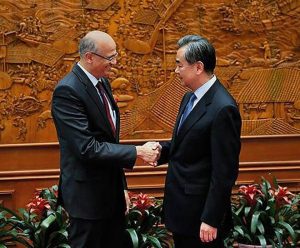
In a major diplomatic triumph for India, China has finally agreed to the designation of Masood Azhar, the founder of Pakistan-based militant group Jaish e-Mohammed, as a global terrorist by the UN Security Council, which is set to pave the way for stronger and harmonious relations with India.
A big victory: Modi

The declaration of Azhar, the architect of several terror attacks in India, including the Pulwama massacre, by the UNSC on May 1 as a global terrorist triggered celebrations across India, especially in strategic circles. In a campaign speech in Jaipur, Prime Minister Narendra Modi said that the United Nations’ decision to list Azhar as a global terrorist was a “big victory” in the fight against terrorism and underlined that it showed the world can’t remain indifferent to the voices of 1.3 billion people of India. “The world has begun listening to India over the last few years. We cannot be ignored anymore. And I would like to say openly that this is just the start. Just wait and see what happens next,” PM Modi said.
‘A step in right direction’
India’s external affairs ministry promptly welcomed the terrorist designation of Masood Azhar. “The 1267 Sanctions Committee’s decision to designate the leader of Jaish-e-Mohammad, Masood Azhar, as a UN proscribed terrorist is a step in the right direction to demonstrate the international community’s resolve to fight against terrorism and its enablers,” said Mr Raveesh Kumar, the spokesperson of India’s external affairs ministry. “We welcome the decision. This is in accordance with India’s position and in line with the information that India has shared with the members of the Sanctions Committee regarding terrorist activities of Masood Azhar and the Jaish-e-Mohammad,” he said.
“India will continue with its efforts through international forums to ensure that terrorist organizations and their leaders who cause harm to our citizens are brought to justice,” the spokesperson added.
China’s position
In a statement, China’s Foreign Ministry spokesman Geng Shuang said that “after careful study of the revised materials and taking into consideration the opinions of relevant parties concerned, China does not have objection to the listing proposal.” Chinese Foreign Ministry spokesman Geng
“The 1267 Al Qaeda Sanctions Committee of the UN Security Council has detailed criteria for the listing procedures. China always believes that the relevant work should be carried out in an objective, unbiased and professional manner and based on solid evidence and consensus among all parties,” Mr Geng said.
China, however, lauded Pakistan for its “contribution to fighting terrorism”, despite facing accusations from India and other nations about sheltering terrorists on its soil.
China had blocked the proposals to proscribe Azhar in the UNSC committee four times over the last decade. On March 13, Beijing had put a technical hold on the listing of Azhar in the aftermath of the terrorist attack in Pulwama in Kashmir, which sparked massive outrage in India.
Wuhan spirit: Better India-China ties

Since then, India remained diplomatically engaged with China in a bid to break the impasse over the Azhar issue. During his visit to China late April, India’s Foreign Secretary Vijay Gokhale held detailed discussions in Beijing with top Chinese officials, including Foreign Minister Wang Yi, and renewed the pitch for the listing of the JeM chief. The US, along with Britain and France, also upped the pressure on China by moving a resolution on listing Azhar in the UNSC, thereby raising reputational costs for Beijing if the latter persisted in stalling the designation of the Pakistan-based head of Jaish e-Mohamed.
After a careful cost-benefit analysis of its posture of shielding Masood Azhar, China decided that the costs of protecting Azhar and alienating India exceeded that of the benefits of appeasing its long-time ally Pakistan.
China’s decision to go along with the international community in proscribing Azhar removes a decade-long irritant in bilateral ties and looks set to have a force-multiplier effect on India-China relations. The decision is set to restore positive momentum in India-China relations, which moved onto a higher orbit after the first informal summit between Prime Minister Narendra Modi and Chinese President Xi Jinping in Wuhan in April last year.
Author Profile

- Manish Chand is Founder and Editor-in-Chief of India Writes Network (www.indiawrites.org) and India and World, a pioneering magazine focused on international affairs. He is CEO, Centre for Global India Insights, an India-based think tank focused on global affairs.
Latest entries
 India and the WorldFebruary 27, 2026Modi visit: India-Israel partnership enters a new era
India and the WorldFebruary 27, 2026Modi visit: India-Israel partnership enters a new era India and the WorldFebruary 24, 2026Unravelling Modi’s Israel journey: What to expect
India and the WorldFebruary 24, 2026Unravelling Modi’s Israel journey: What to expect India and the WorldFebruary 17, 2026South-by-South: Focus on people-centric solutions at India AI summit
India and the WorldFebruary 17, 2026South-by-South: Focus on people-centric solutions at India AI summit India and the WorldFebruary 7, 2026Modi hails interim India-US trade deal, Goyal says no concessions made on agriculture
India and the WorldFebruary 7, 2026Modi hails interim India-US trade deal, Goyal says no concessions made on agriculture







